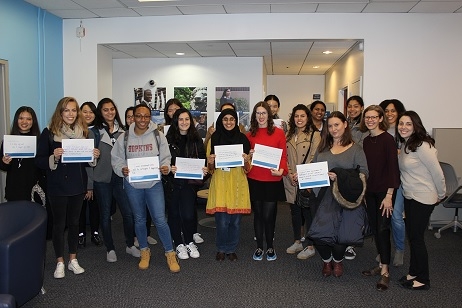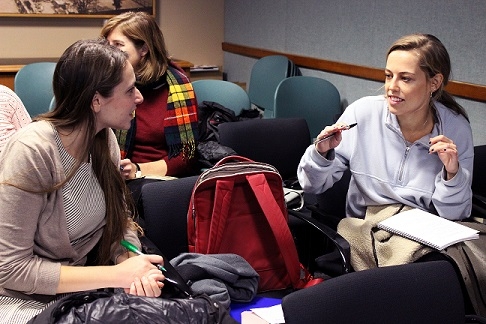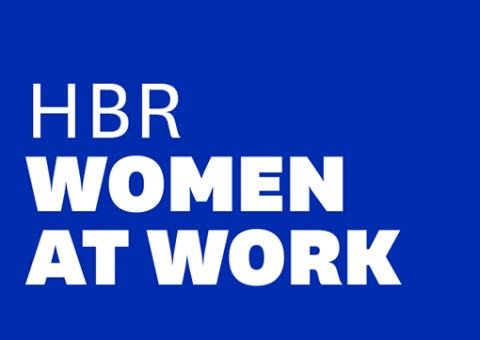CCE and Women in the Workplace

The good news is that many employers seek to increase their recruitment of women and promote and support women in their workplaces. Women, however, continue, to face unique challenges during the job/internship search and on the job. Some concerns that women at Columbia have shared with our office include learning how to:
- identify companies that support and advance women
- negotiate salaries throughout their careers
- get promoted and recognized for their contribution
- initiate and build mentor relationships
We are committed to supporting you with curated resources and one on one counseling appointments to help navigate these topics.
Columbia University Resources
There are many organizations, initiatives, and offices on campus to support women and provide opportunities and information including:
- CCE holds workshops geared toward the career needs of women each semester
- Columbia Women’s Business Society Alumnae Group
- She Opened The Door - Columbia University Women’s Conference
- SEAS Women in Science & Engineering Conference
- Student organizations like LeanIn @ Columbia, Columbia Women’s Business Society, Columbia Women in Law & Politics, Women in Computer Science, Society of Women Engineers, Women in Science at Columbia
- Office of Gender-Based Misconduct
Columbia undergraduates also have special access to the Forte Rising Stars program through the Forte Foundation, courtesy of Columbia Business School.
Identifying Organizations that Support and Advance Women at Work
There are many ways that organizations can support and advance women and support gender parity in the workplace including:
- Offering mentorship programs
- Supporting women-focused recruiting initiatives
- Offering generous parental leave and flexibility policies
- Prioritizing having women represented in leadership roles and in board positions
- Providing back-to-work programs for women re-entering the workforce
- Committment to equal pay
When evaluating organizations, there are a number of questions you can ask yourself and the organization including:
- Does the organization have a diversity statement that includes women? What, specifically, does it say?
- What supports does the company have for women in the workplace, including affinity groups? Who is part of those groups?
- Does the company share any numbers or data to support any claims of gender parity?
- Are there mentorship or sponsorship programs at the organization for women?
- What are the workplace policies for parental leave and flexibility?
- Does the organization have a commitment to equal pay?
- Who is in leadership roles? Who is in board roles? How long have they been in these roles?
You can also use many tools to evaluate an organization including:
- Company websites and social media accounts
- Coverage of the organization in the news
- Corporate social responsibility initiatives
- Corporate sponsorships (e.g., festivals, organizations, movements)
- Using About Us/Staff pages and LinkedIn to look at those in leadership roles (who is in current roles, who has left recently)
- Asking questions on informational interviews and during the interview process about company values and initiatives
Additional websites to help you evaluate organizations:
- Fairy God Boss Best Companies for Women
- Anita B
- Catalyst’s Workplaces That Work for Women
- Measure What Matters: Top Companies for Women Technologists
- Bloomberg’s Gender Equity Index
- Forbes Best Employers for Diversity
- Paradigm for Parity
- 30% Club
For more on this topic, check out:
Mentors & Sponsors
Throughout your career, it’s important to find people inside and outside of the workplace who can assist you in your professional growth. These relationships can vary, but often take two forms: mentors and sponsors.
A mentor is someone who can help develop a vision for your career, provide advice, help you see your potential, and listen to challenges and ideas you may be considering.
A sponsor might also do these things, however, sponsors are the individuals who will champion you, advocate for your success and value within your organization, and open doors. Often, it is sponsors who can protect you and help you to achieve raises and promotions.
Both mentors and sponsors can play a valuable role, and finding these individuals can aid in your progress.
Outside of structured mentorship programs you might join, most mentor and sponsor relationships are built organically. The more you invest in these relationships, the further they will grow and support you as well as your sponsor or mentor.
What to Look For in Mentors/Sponsors
Mentors
A mentor can be someone you have or have not worked for in the past. It could be a former supervisor, colleague, professor, upperclassman/student further along in an academic program, or advisor who knows you well and models the type of professional you aim to become. Your mentor is someone:
- That is a role model – whose career trajectory or professional approach you admire
- You trust and whose opinion and advice you value
- You can turn to during times of transition or challenge
- Who can give you specific, actionable feedback
Sponsors
Finding a sponsor requires you to stand out in your work. Sponsors are staking their reputation to vouch for you, so be sure that you work hard and continue surpass expectations. By consistently performing at a high standard, both you and your sponsor can demonstrate and vocalize your value. Your sponsor:
- Has seniority and credibility at your organization and the power and respect to get things done/ advocate for you
- Shares your values and vision – you are working toward the same goals
- Can refer and recommend you to opportunities, and open doors
Nurturing the Relationship
Mentorship and sponsorship are a two way street. Like any relationship, they take nurturing. You can:
- Communicate clearly and regularly with mentors and sponsors
- Follow through on recommendations, requests and expectations
- Lend a hand/volunteer with your areas of expertise for your mentors or sponsors
- Share successes and outcomes of your work and progress
- Share information that aligns to their work or area of focus
WAYS TO LEARN MORE
- Forbes: Why Having a Sponsor is Important for Women and How to Get One
- HBR: The Right Way to Find a Career Sponsor
- LeanIn: Four Things all Mentors & Mentees Should Know
Columbia Resources
- Many of CCE’s internship programs including a mentoring component. For example, check out STEP.
- Many pre-professional campus clubs/organizations as well as student services departments offer connections to mentors
- Columbia College Odyssey Mentoring
Salary Negotiation

The book “The Confidence Code” argues that men initiate salary negotiations 4x as often as women do, and when women do negotiate, they ask for 30% less money than men. And, according to AAUW, in 2016 women working full time in the United States were paid just 80 percent of what men were paid.
You can meet with a career counselor at any stage in your job search to talk about techniques for salary negotiation, build your skills in this area, and take steps to help end the gender pay gap.
To get started on the basics of the topic, tap into CCE’s resources on salary negoTIATION:
Salary range research & negoTIATION tools:
- American Association of Undergraduate Women salary negotiation courses and resources
- Salary.com
- PayScale
- The Salary Project
- Glassdoor’s Know Your Worth
- Hired’s Salary Calculator for Tech/Data Positions
Additional Resources
These are some of our favorite resources for information, events, inspiration, and stories:
- Forte Foundation - Columbia undergraduates have special access to the Forte Rising Stars program courtesy of Columbia Business School
- LeanIn’s extensive library of videos, articles and tips
- Harvard Business Review articles and podcasts on Women at Work
- iRelaunch
- Career Contessa
- Women in the Workplace Report from LeanIn.Org and McKinsey & Company
- NY Times New Rules Summit and Working Woman’s Handbook
- Flexwork Alliance






